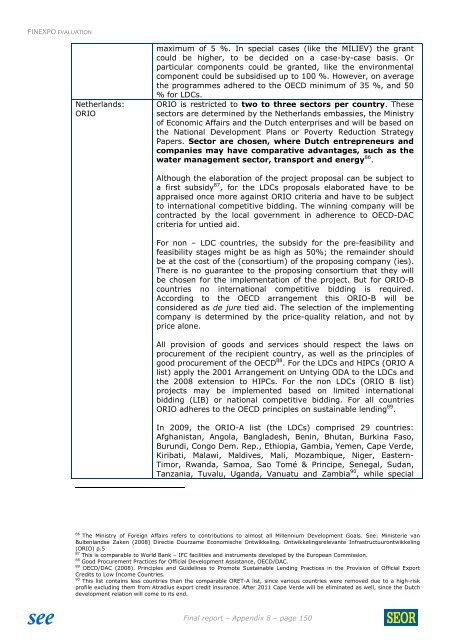Evaluatierapport (PDF, 6.47 MB) - Buitenlandse Zaken - Belgium
Evaluatierapport (PDF, 6.47 MB) - Buitenlandse Zaken - Belgium
Evaluatierapport (PDF, 6.47 MB) - Buitenlandse Zaken - Belgium
You also want an ePaper? Increase the reach of your titles
YUMPU automatically turns print PDFs into web optimized ePapers that Google loves.
FINEXPO EVALUATION<br />
Netherlands:<br />
ORIO<br />
maximum of 5 %. In special cases (like the MILIEV) the grant<br />
could be higher, to be decided on a case-by-case basis. Or<br />
particular components could be granted, like the environmental<br />
component could be subsidised up to 100 %. However, on average<br />
the programmes adhered to the OECD minimum of 35 %, and 50<br />
% for LDCs.<br />
ORIO is restricted to two to three sectors per country. These<br />
sectors are determined by the Netherlands embassies, the Ministry<br />
of Economic Affairs and the Dutch enterprises and will be based on<br />
the National Development Plans or Poverty Reduction Strategy<br />
Papers. Sector are chosen, where Dutch entrepreneurs and<br />
companies may have comparative advantages, such as the<br />
water management sector, transport and energy 86 .<br />
Although the elaboration of the project proposal can be subject to<br />
a first subsidy 87 , for the LDCs proposals elaborated have to be<br />
appraised once more against ORIO criteria and have to be subject<br />
to international competitive bidding. The winning company will be<br />
contracted by the local government in adherence to OECD-DAC<br />
criteria for untied aid.<br />
For non – LDC countries, the subsidy for the pre-feasibility and<br />
feasibility stages might be as high as 50%; the remainder should<br />
be at the cost of the (consortium) of the proposing company (ies).<br />
There is no guarantee to the proposing consortium that they will<br />
be chosen for the implementation of the project. But for ORIO-B<br />
countries no international competitive bidding is required.<br />
According to the OECD arrangement this ORIO-B will be<br />
considered as de jure tied aid. The selection of the implementing<br />
company is determined by the price-quality relation, and not by<br />
price alone.<br />
All provision of goods and services should respect the laws on<br />
procurement of the recipient country, as well as the principles of<br />
good procurement of the OECD 88 . For the LDCs and HIPCs (ORIO A<br />
list) apply the 2001 Arrangement on Untying ODA to the LDCs and<br />
the 2008 extension to HIPCs. For the non LDCs (ORIO B list)<br />
projects may be implemented based on limited international<br />
bidding (LIB) or national competitive bidding. For all countries<br />
ORIO adheres to the OECD principles on sustainable lending 89 .<br />
In 2009, the ORIO-A list (the LDCs) comprised 29 countries:<br />
Afghanistan, Angola, Bangladesh, Benin, Bhutan, Burkina Faso,<br />
Burundi, Congo Dem. Rep., Ethiopia, Gambia, Yemen, Cape Verde,<br />
Kiribati, Malawi, Maldives, Mali, Mozambique, Niger, Eastern-<br />
Timor, Rwanda, Samoa, Sao Tomé & Principe, Senegal, Sudan,<br />
Tanzania, Tuvalu, Uganda, Vanuatu and Zambia 90 , while special<br />
see<br />
86<br />
The Ministry of Foreign Affairs refers to contributions to almost all Millennium Development Goals. See: Ministerie van<br />
<strong>Buitenlandse</strong> <strong>Zaken</strong> (2008) Directie Duurzame Economische Ontwikkeling. Ontwikkelingsrelevante Infrastructuurontwikkeling<br />
(ORIO) p.5<br />
87 This is comparable to World Bank – IFC facilities and instruments developed by the European Commission.<br />
88 Good Procurement Practices for Official Development Assistance, OECD/DAC.<br />
89 OECD/DAC (2008). Principles and Guidelines to Promote Sustainable Lending Practices in the Provision of Official Export<br />
Credits to Low Income Countries.<br />
90 This list contains less countries than the comparable ORET-A list, since various countries were removed due to a high-risk<br />
profile excluding them from Atradius export credit insurance. After 2011 Cape Verde will be eliminated as well, since the Dutch<br />
development relation will come to its end.<br />
Final report – Appendix 8 – page 150

















